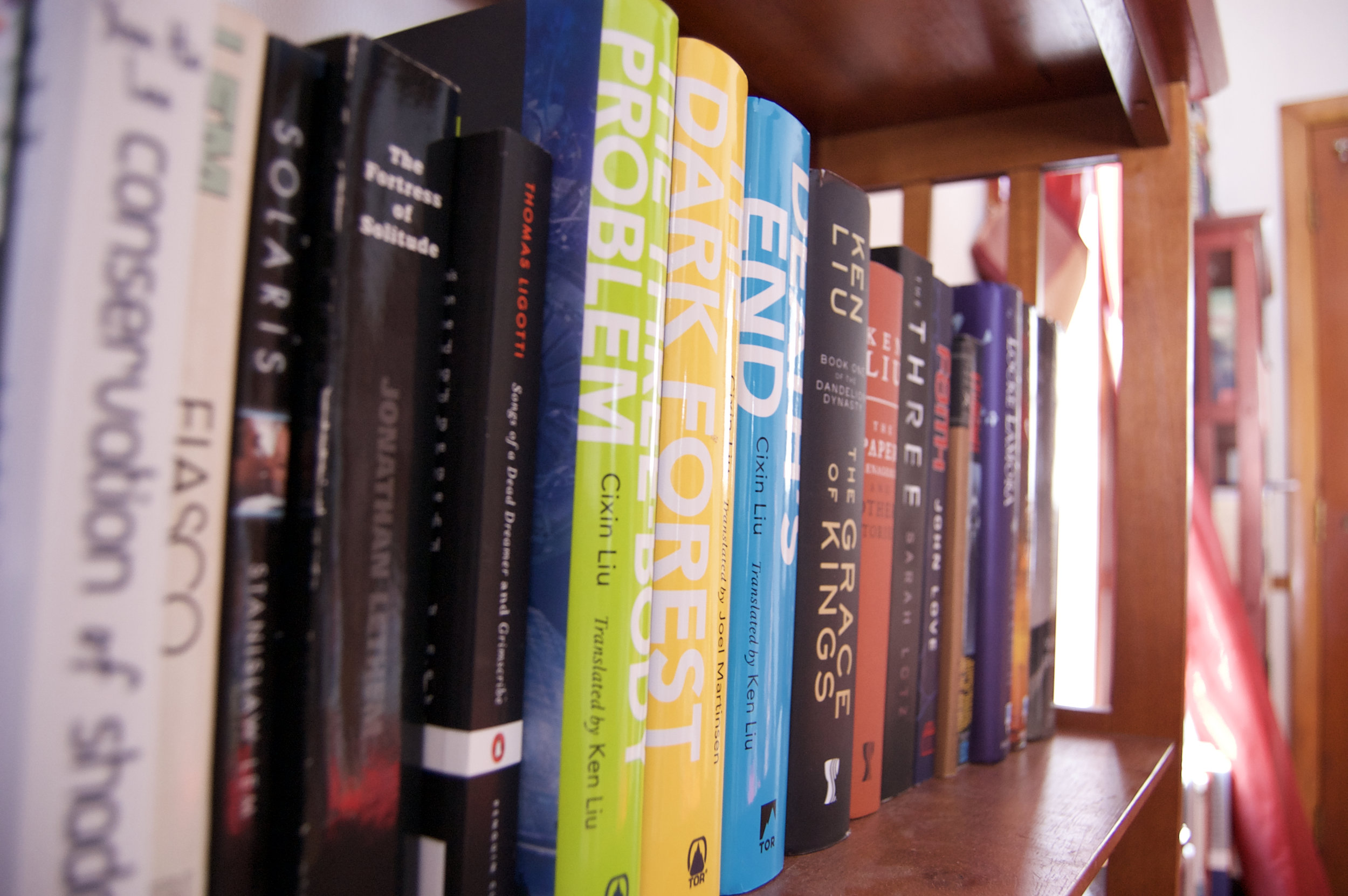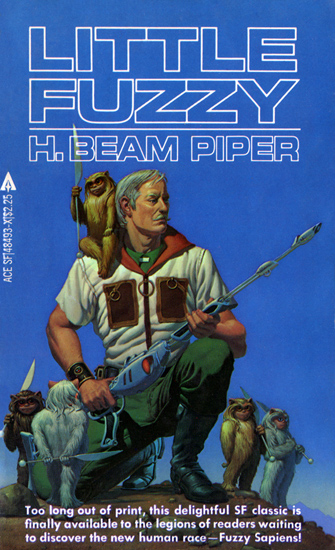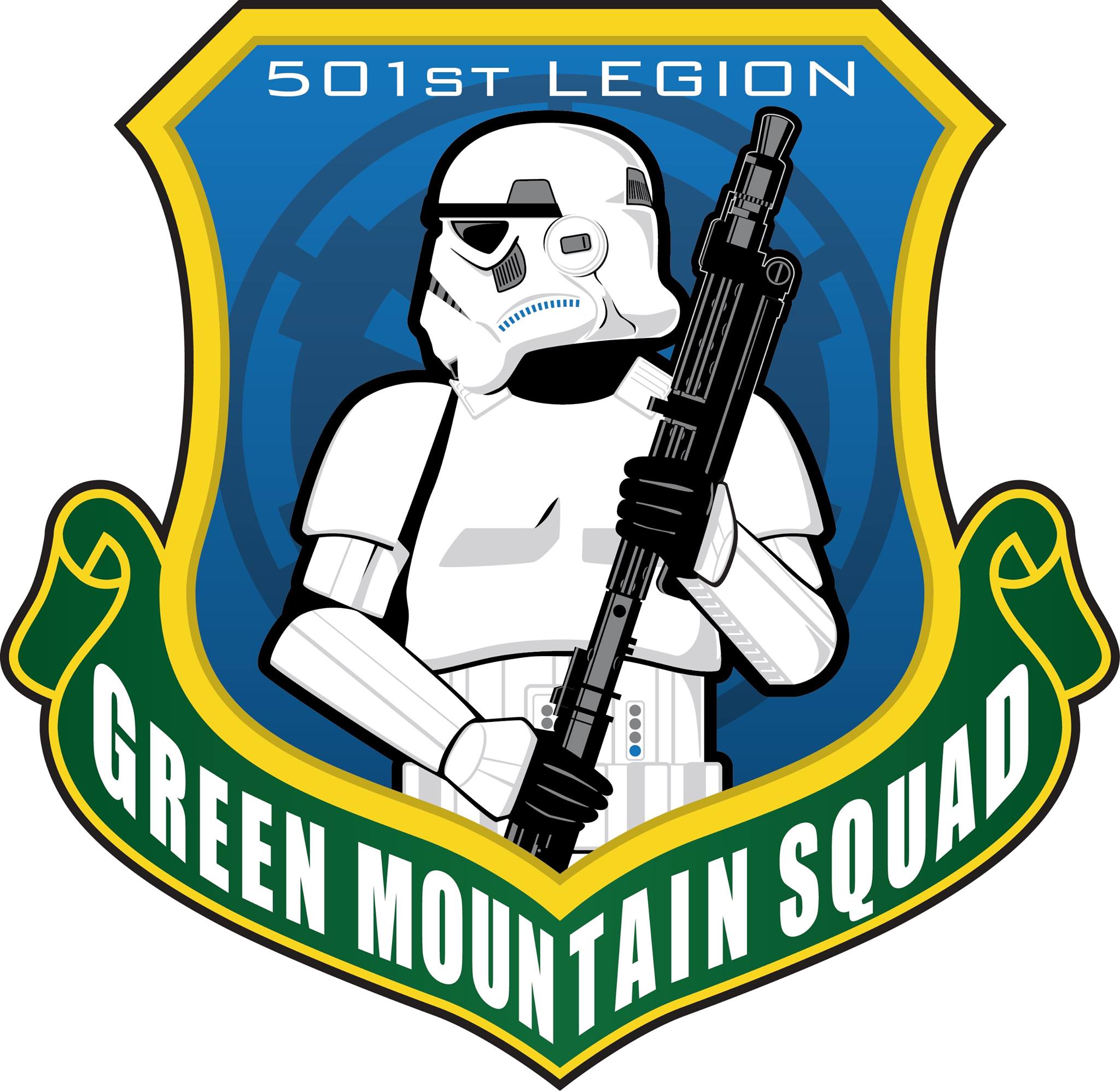 I've been asked a couple of times from various people about reviewing books and my approach to the types of articles that I've written in recent years.
I've been asked a couple of times from various people about reviewing books and my approach to the types of articles that I've written in recent years.
It seems like there's a couple of general forms for these questions / requests:
- How do you go about picking books to review?
- Can I please give you a copy of my book? You don't have to review it, just read it!
- How do I get you a review copy? / How do I get the attention of a reviewer?
Let me preface this by saying that this is my approach, and that generally, reviewing books is a side exercise to most of the reporting that I do and have done. There's not a whole lot of demand for it across the internet, and the loss of genre-specific publications such as SF Signal, A Dribble of Ink, and others tightens up that market considerably.
Because I've been doing this for a little while and because I've written for places that get decent traffic, I'm on the mailing lists for a bunch of publishers, who want me to take a look at what they have. (For a good look into how the publicists work, listen to SF Signal Podcast #275)
What that means is that I'm getting to know my postman and UPS guys pretty well. They stop by my house 2-4 times a week. If you follow me on Twitter or Facebook, you'll probably see that I post up pictures every couple of days of what I get in. Those books pile up fast, and there's no humanly way possible for me to even read a fraction of what comes through the door. Getting the books is fine: I read over most of what I take in, to see if I'm interested: I come across some interesting books that way that I might not have otherwise found.
This is where the triage comes in. The books that don't make that first cut go into a couple of piles:
- 2-3 stacks, for the books that are coming out in the next couple of months. These aren't ones that I'm planning on reading, but they look sufficiently interesting to hang on to, so that I make sure they end up on New Adventures for The Verge.
- Discard pile: these are books that have a) either come out already, b) I have a copy already, or c) it's not a book that I can/want to include on the list for any number of reasons. I've been bringing these piles to my monthly book club for people to take - they'll whittle down the pile, and I'll hand off the copies to family members, friends, etc. If I have a lingering pile by the time I hit a convention, I'll usually drop that off on the free pile. Others will get donated to a library.
If I get a book that I'm interested in, I'll haul it up to my office, where it gets stuck into another chronological pile by release date. This is something I want to review. It looks interesting, and it's essentially my to-get-to pile. There's some books that immediately come to the top as a high priority to read, while there are some others that I'll pick up if I can get to them. Some books, even high-priority books, get dropped off because I miss the release date, or because I get a couple of chapters in and didn't like it.
There's a second pile that I've got going up here - books that I'm planning on reading, but which the release date has passed. I might still post up a review, or I might just read it because I like the author, what the book is about, or the cover art. I tend to keep my eyes open for what others are saying about it. There's some people who's judgement I trust, and if they've liked it, that's helpful to know. (But, it's not failsafe - I've despised some well-regarded books, and loved some books that people hated).
Review dates are important here, for a couple of reasons. Publishers and authors are working to get the word out, and potential buyers, fans and interested readers are looking. This is the best time for a review to go up, because you have a certain amount of attention that's looking to be steered towards a review or commentary on the book. However, how much traffic a book will generate isn't the first consideration that goes through my head when I pick up something to read. In all the time that I've been reviewing (with SF Signal, io9, Lightspeed, Verge, etc), I've never been asked to review a book because it'll generate traffic, or because there's some sort of deal in place at the site.
Finally, I pick up the book and read it! Some books get dropped halfway through so that I can cut my loses and move onto the next one. The pile for the rest of the year? ~20 books, with an additional four that I'm reading now. I tend to read 4-6 books at any given time. I'll take a stack with me and read a couple of chapters at a time between a couple to see what breaks out for me, and when one does, I'll finish that up. There's times when I'll also pick up an audiobook, particularly a book that's taking me a long time to get through, to listen to when I'm driving, which helps move the pace along a bit.
When I'm done with the book, I'll jot down a rough outline and get it written up while it's fresh in my mind. I don't usually take notes or anything like that, but I'll go back and read up on a passage or chapter if I need to. Then, the review gets posted in the appropriate venue (currently, either this blog, Verge or Lightspeed), and I move onto the next entry in the pile.
With that in mind, here's a couple of questions that I've gotten:
Can I please give you a copy of my book? You don't have to review it, just read it!
Erm, no. I've seen this question pop up more than once, particularly along self-published authors, and I'm not sure why it's only in that small subset (I could be wrong, but I've never had a traditionally published author ask me that).
The problem with this question is that most of my reading is tied up with professional commitments. I have a finite amount of time in the day to read, and there's already a waiting list. If you're doing the digital equivalent of shoving a book in my face with a demand to read it, you're demanding my time, which is finite.
The books that I'm reading for review are ones that I deem interesting and worthy for the outlets I write for, and that's judgement that I've honed as a reviewer, and a quality that my editors seem to like. For my own pleasure, I'm picking up books that interest me the most.
How do I get you a review copy?
I've got a ton of books already, and adding more to the pile means that the mailman / UPS guys have to make another trip over. If you're a regularly published author (I.E., not self-published) with a publicity department, feel free to have your publicist get in touch. If you're self-published, free free to send me a link / blurb. If I like what I see, I'll let you know. If I don't, I'm not really interested in having a book that I have to get rid of - it's not a good use of resources for you or me.
Why do you hate self-published books?!
I've been accused of this. The short answer is, I don't. I don't pick them up all that often, but there's reasons for that: there's a whole publicity apparatus set up by the major publishers, and it's hard to get the word out in the flood of other books. I've read and reviewed self-published books — I recently picked up Cumulus by Eliot Peper and reviewed it for io9. A mutual friend recommended the book, and he queried me about how I he could get me a copy.
Most of the time, I'll pass on a book if I'm queried - remember, there's a whole system of piles - because it's something I'm simply not interested in. (I reject a ton of traditionally published books, too!)
How can I stand out to reviewers?
Book publicity is hard, tiring and discouraging. I've been there: I had to market War Stories: New Military Science Fiction when that came out a couple of years ago, and it was an exhausting process to get people to look at the book. Some colleagues in the reviewing world picked it up and some didn't.
The best way to stand out to reviews is to have an outstanding book. That might sound glib, but I'm being serious. Every author thinks that their book is the best out there. Some things do help: professional messaging, like a press package (blurb, cover art, a handful of review excerpts, etc) goes a long way.
Packaging your book helps too. While I primarily go by the blurb on the back of the book to decide whether or not I read it, the cover does make an impression. It doesn't always factor in, but seriously, don't half-ass it with Microsoft Paint.
Obviously, there's exceptions to every rule: there's plenty of great books with terrible covers out there (Just look at all the modern covers for Ringworld), and there's plenty of great covers with terrible books (just look at Ernie Cline's Armada).
What should I do if you tell me you're not interested in my book?
Move on to the next reviewer. Seriously, move on.
Your book might not have worked for a number of reasons: I might not like that type of book; I might have reviewed something like it already; I might have too many books on my plate as it is.
If you decide to argue the point, I'm just going to delete your e-mail. If you tell me that I'm biased or that I hate authors/self-publishing/Fantasy/whatever, I've lost interest. I've already decided that I'm not interested in your book: what makes you think that I'm interested in your argument about it? Being rude isn't going to help you.
The long and short of it comes down to resource and time management. I'd like to read everything, but I have to be selective. I try and make sure that everything that comes through the door at least gets publicized with a picture, and that I review the stuff that I like and that I think other people will like. The main criteria that I have for a review? I liked a book enough to tell people that I think that they should read it. Everything up to that point is finding the right book. I don't find all of them, but I do try.
Anyway, that's my approach.
 This is a cool book I picked up recently: The Card Catalog: Books, Cards and Literary Treasures, written by the Library of Congress. It's a cool blend of history and visuals, and if you're nostalgic at all for the days of the card catalog or even libraries, it's well worth picking up.
This is a cool book I picked up recently: The Card Catalog: Books, Cards and Literary Treasures, written by the Library of Congress. It's a cool blend of history and visuals, and if you're nostalgic at all for the days of the card catalog or even libraries, it's well worth picking up.
 If you're in central Vermont this Thursday, stop by the Sullivan Museum & History Center at Norwich University. I'll be giving a talk called The Art of Empire: WWII influences in Star Wars. I'll be talking a bit about some of the images and iconography of Nazi Germany, particularly with how it is used for the Empire.
If you're in central Vermont this Thursday, stop by the Sullivan Museum & History Center at Norwich University. I'll be giving a talk called The Art of Empire: WWII influences in Star Wars. I'll be talking a bit about some of the images and iconography of Nazi Germany, particularly with how it is used for the Empire. A couple of weeks ago, a friend of mine talked about how she had gotten away for a 'Reading Vacation'. The idea sounded glorious, and between February and March, I realized that I was in a bit of a rut, and needed to take some time to step away from the computer and everything for a while. I'm not good at taking time off; it's not how my brain works.
A couple of weeks ago, a friend of mine talked about how she had gotten away for a 'Reading Vacation'. The idea sounded glorious, and between February and March, I realized that I was in a bit of a rut, and needed to take some time to step away from the computer and everything for a while. I'm not good at taking time off; it's not how my brain works.
/cdn0.vox-cdn.com/uploads/chorus_asset/file/8073505/27120693842_448487de29_b.jpg) I have a
I have a  I've got a new column up on Kirkus Reviews this morning. This week, I'm looking at the career of H. Beam Piper, a science fiction writer who was active between the 1940s and 1960s, famously known for a book called Little Fuzzy.
I've got a new column up on Kirkus Reviews this morning. This week, I'm looking at the career of H. Beam Piper, a science fiction writer who was active between the 1940s and 1960s, famously known for a book called Little Fuzzy. It's that time of the year: fans from around science fiction fandom are submitting their nominations (deadline is the 17th of March, I think) for this year's Hugo Awards. While I'm filling mine out, I'm reminded of a critical thing: don't ignore the 'flyover' categories.
It's that time of the year: fans from around science fiction fandom are submitting their nominations (deadline is the 17th of March, I think) for this year's Hugo Awards. While I'm filling mine out, I'm reminded of a critical thing: don't ignore the 'flyover' categories. When I was a kid, I remember a classmate bringing this book into class one day: it was a fascinating book to page through. It's also a strange one: illustrations of aliens from books and movies. It's the sort of thing that only the science fiction community could support and produce.
When I was a kid, I remember a classmate bringing this book into class one day: it was a fascinating book to page through. It's also a strange one: illustrations of aliens from books and movies. It's the sort of thing that only the science fiction community could support and produce. One of the books that I picked up over the holidays as Ursula K. Le Guin's The Word for World is Forest, which I've been reading in drips and drabs this month. It's a really stunning work of fiction, and it's a book that feels all the more relevant with what the Trump administration is shaping up for when it comes to policy, particularly around environmental areas.
One of the books that I picked up over the holidays as Ursula K. Le Guin's The Word for World is Forest, which I've been reading in drips and drabs this month. It's a really stunning work of fiction, and it's a book that feels all the more relevant with what the Trump administration is shaping up for when it comes to policy, particularly around environmental areas. The last of my childhood dogs passed away last night. Fionna had been sick for a while, but she's lasted far longer than I think anyone had expected. Even as she grew thinner, she never seemed to lose her upbeat and perky nature.
The last of my childhood dogs passed away last night. Fionna had been sick for a while, but she's lasted far longer than I think anyone had expected. Even as she grew thinner, she never seemed to lose her upbeat and perky nature.
 So, I go to more kids movies than I used to: my son is three and a half, and we've taken him to see a bunch of films in the movie theater. He sits (for the most part), and looks utterly adorable crunching a small bag of popcorn. There's been some solid kids movies that we've gone to - Moana and Zootopia, which are a good reminder of how kids movies can be smart and entertaining. We just went to see Sing, and while it was fun, it's a good example of what not to do.
So, I go to more kids movies than I used to: my son is three and a half, and we've taken him to see a bunch of films in the movie theater. He sits (for the most part), and looks utterly adorable crunching a small bag of popcorn. There's been some solid kids movies that we've gone to - Moana and Zootopia, which are a good reminder of how kids movies can be smart and entertaining. We just went to see Sing, and while it was fun, it's a good example of what not to do. I'm a sucker for durable space opera novels. I like crews on space ships flying around doing things in the vastness of space, and one of the books that I came across earlier this fall was Scott Warren's new novel Vick's Vultures.
I'm a sucker for durable space opera novels. I like crews on space ships flying around doing things in the vastness of space, and one of the books that I came across earlier this fall was Scott Warren's new novel Vick's Vultures. I'll be talking at Norwich University on Monday, October 31st at noon, about J.R.R. Tolkien's experiences during World War I and how it impacted his works. I'll be there along with Professor Gina Logan.
I'll be talking at Norwich University on Monday, October 31st at noon, about J.R.R. Tolkien's experiences during World War I and how it impacted his works. I'll be there along with Professor Gina Logan. There was a
There was a  Nightshades was a book that I had placed on
Nightshades was a book that I had placed on 
 Star Trek is one of those franchises that I've only dipped into occasionally: I never watched much of the shows, and I was more of a Babylon 5, Stargate SG-1 and Battlestar Galactica fan in college.
Star Trek is one of those franchises that I've only dipped into occasionally: I never watched much of the shows, and I was more of a Babylon 5, Stargate SG-1 and Battlestar Galactica fan in college.
 I've been asked a couple of times from various people about reviewing books and my approach to the types of articles that I've written in recent years.
I've been asked a couple of times from various people about reviewing books and my approach to the types of articles that I've written in recent years.